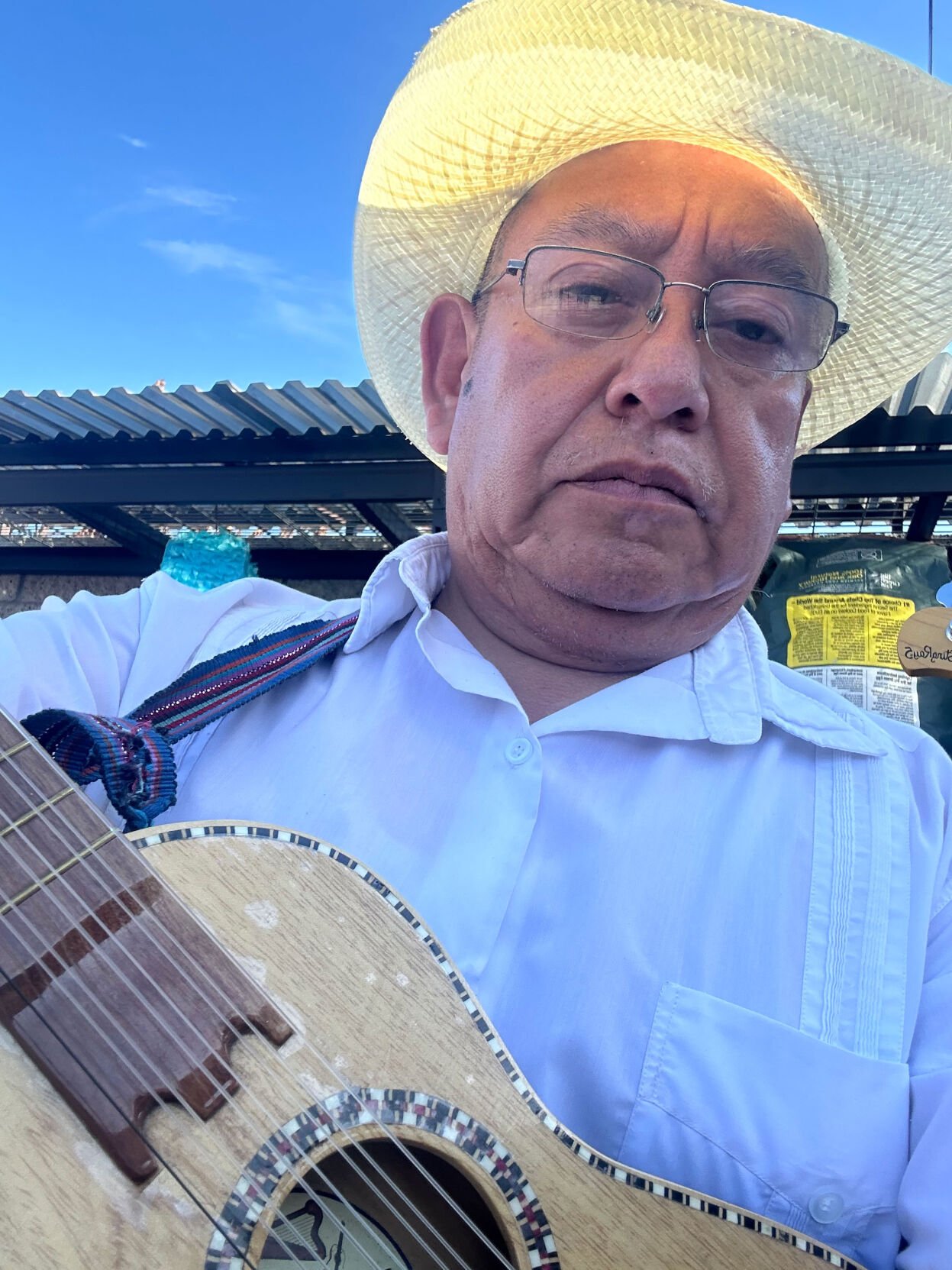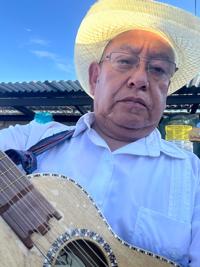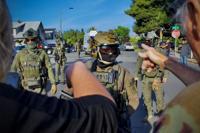Emilio Amaya's story is one of resilience, commitment, and empathy. Since 1987, he has been a cornerstone in the fight for immigrants' rights in the Inland Empire, dedicating his life to serving the community through non-profits, and providing legal services to countless individuals who have found him to be a trustworthy advocate.
Amaya grew up in the heart of a bustling mercado in Veracruz, where his father worked as a comerciante, selling fruits to make ends meet. Life at home, however, was far from peaceful. Domestic violence and poverty weighed heavily on him, and by the time he turned 14, Amaya had enough. With no real prospects for continuing his education, he boldly decided to leave.
Together with a friend, he set off on a journey that took him from Veracruz to Mexico City and then to Guadalajara, with no money and no clear destination. In Guadalajara, they learned about a train that could take them north to Mexicali called the Tren Bala. After hopping on, they spent several months living near the border, doing odd jobs and sometimes asking for food.
Determined to reach the U.S., Amaya and his friend made multiple attempts to cross, often getting caught and sent back to Mexico. But after nearly twenty attempts, he finally made it across—unwavering, resilient and ready for a new chapter.
The kindness of strangers
The train brought Amaya to Indio, California, eventually finding his way to Los Angeles. With no family or support network, he spent the first few weeks sleeping in places like La Placita Olvera and Pershing Square. It was a tough time, but then he met someone from Michoacán who empathized with his situation. This man, having once been in a similar position, offered Amaya a place to stay in his garage and a little money to search for work.
Despite Amaya’s efforts, finding work in L.A. was hard, and the man took him to Riverside to live in “la palomera,” an old abandoned house where a group of farm workers used to live. It was there that he landed a job picking oranges. He was just a kid without family or a support network, and at that time it was rare to find someone from his hometown of Veracruz in California. But with the kindness of a stranger who had once walked in his shoes, he found a way to survive.
“Sometimes you find [people] that empathize with what [you’re] going through, and they offer you help. [It’s] people helping people,” Amaya said.
Life as a Latino immigrant brought Amaya many challenges, from not being paid by employers after his labor, to facing discrimination. He also recalls the times when immigration officers arrested him without offering any information or access to his legal rights. All of these experiences later motivated him to fight for immigrant rights.
His journey as an advocate started in 1987 when he met Father Patricio Guillen, a priest with the San Bernardino Diocese, who extended him an invitation to join a local youth group. Through this group, Amaya was introduced to Father Patricio's collaborator, Sister Rosa Martha Zarate, who, alongside the priest founded a nonprofit community organization called Librería del Pueblo. That same year, the Immigration Reform and Control Act, which granted amnesty to millions of undocumented immigrants, was passed. Amaya began to volunteer at the non-profit, helping prepare legal documents for people applying for amnesty.
“Eventually, they hired me to work for Libreria del Pueblo in their legal services office,” Amaya recalled. The non-profit’s legal department, which Amaya helped establish, was was known at that time as “Servicios comunitarios.”
A fresh beginning
In 2000, Amaya, together with other advocates like Monica Torres and Jose Cisneros, foundedthe San Bernardino Community Service Center to help the extensive community of the Inland Empire with immigration legal services. To this day, they continue to assist individuals in becoming legal residents or U.S. citizens, handling DACA renewals, U Visas and other visa petitions. Their goal is to support the community through the often-complicated immigration process.
In addition, they have a dedicated department focused on deportation defense, providing essential help to those in removal proceedings. For unaccompanied minors, they offer a special program that includes case management and limited social services, helping children and youth find stability and making a meaningful difference in the people they serve.
Amaya recalls that in the years they opened the Center, no one was stepping up to help with legal representation for immigrants facing deportation. He considers that they were forced to get creative and took matters into their own hands. “If nobody's doing it, let's do it ourselves,” he said. He got organized and became a DOJ-accredited representative to be legally capable of providing the “legal representations that nobody else was doing,” he explained.
All that hard work has paid off. The center has successfully assisted over 10,000 cases, including Karla Castañeda’s, whose life took a harrowing turn when her daughter was kidnapped in Ciudad Juárez. Desperate for answers, she fought tirelessly to get the local government to investigate the case, but instead of support, Castañeda received death threats. Fearing for her life and the safety of her four children, she had no choice but to flee to the U.S., seeking asylum. The Center’s legal representation in Castañeda’s case helped her to win the asylum case, obtaining protection for her and her children.
“I actually don't see this as work. For me, [it’s] a mission,” said Amaya. He’s always been driven by a deep passion for helping others. In his experience in the nonprofit world, sometimes the money is there, sometimes it’s not, but that never stops him. “If we run out of money, I'll keep doing this. I'll find some other way to make money [to] pay my expenses,” he explained. “This is what I do because I want to do it regardless.”
Navigating life as an immigrant in the Inland Empire, specifically in places like San Bernardino and Riverside, presents a unique set of challenges. According to Amaya, unlike areas like L.A., which tend to have more abundant resources, the Inland Empire often struggles to secure the same level of support. He considers that local governments are slow to integrate immigrants into the mainstream community, and services can be harder to access, especially when language barriers persist. For him, many immigrants encounter resistance in this region, where there is still a noticeable presence of anti-immigrant sentiment. Despite efforts to bring more resources to the area, the Inland Empire continues to be a difficult place for immigrants to thrive, expressed Amaya.
The efforts in an electoral year
Amaya said that in 2024, the focus of his work and the team at the San Bernardino Community Service Center is all about preparation—making sure the community is ready no matter how things shake out at the federal level. For him, if Trump returns to office, there could be a significant increase in enforcement, so the team is getting everything in place for that possibility. But they're also thinking ahead in case Vice President Kamala Harris wins, hoping that could open up more doors for immigration reform. Civic engagement is at the heart of it all, encouraging people to get involved in the presidential election. Being ready for whatever comes next in Washington is critical for the work this year, he explained.
“We need to understand where we come from… we cannot forget that in order to enjoy some of the rights that we have, other people have already struggled. We all owe to the Chicano movement and the Afro-American civil rights movement because, without them, we wouldn't be here. We wouldn't have access to the rights that we have now,” Amaya said.
He considers it important for immigrants to stay grounded in that history and to know that, just as others helped them, it’s their responsibility to give back and lift others. For him, it’s not just about personal success. t’s about strengthening the community. “I see a lot of hard feelings about some of the new immigrants, people that are coming in the caravan. I think we cannot forget that one day, we were in the same situation, and somebody was there to help us. We need to understand the need to be in solidarity,” he said.
Amaya’s role extends far beyond mere advocacy. He stands at the frontlines of a movement that fights for dignity, equality and justice for the most vulnerable. Through his leadership, countless immigrants in the Inland Empire have found a champion willing to battle for their dreams—dreams not so different from the ones Amaya once carried as a young boy crossing the border alone.











(0) comments
Welcome to the discussion.
Log In
Keep it Clean. Please avoid obscene, vulgar, lewd, racist or sexually-oriented language.
PLEASE TURN OFF YOUR CAPS LOCK.
Don't Threaten. Threats of harming another person will not be tolerated.
Be Truthful. Don't knowingly lie about anyone or anything.
Be Nice. No racism, sexism or any sort of -ism that is degrading to another person.
Be Proactive. Use the 'Report' link on each comment to let us know of abusive posts.
Share with Us. We'd love to hear eyewitness accounts, the history behind an article.